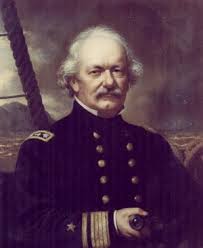Get Today in Masonic History into your Inbox. Sign up today for one of our email lists!
Need an article for your Trestleboard/Newsletter see our Use Policy
Theodorus Bailey Passes Away

Today in Masonic History Theodorus Bailey passes away in 1877.
Theodorus Bailey was an American naval officer.
Bailey was born in Chateaugay, New York on the United States-Canadian border on April 12th, 1805. He received most of his primary education in Plattsburgh, New York.
In 1818, before his 13th birthday, Bailey was posted as a midshipman on the frigate Cyane. The Cyane was tasked from 1819 to 1821 with patrolling the west coast of Africa to guard a new United States colony. The colony was made up of former slaves. While still on the Cyane, in 1821, Bailey saw his first combat when the ship engaged West Indian Pirates.
Later in 1821, Bailey transfered to the ship of the line Franklin. During this period a ship of the line was a vessel built with the single task in mind. In combat a ship of the line along with other similar ships lined up to fire against opposing vessels. Generally the ship which delivered the biggest broadside won the engagement. It was common from the 17th century to the 19th century, when ships of the line were built, new construction vessels were going to be bigger and more powerful to win these types of engagements. Bailey went with the Franklin to the pacific.
In 1827, after a returning from the pacific and spending three years on a vessel in the West Indies, Bailey received his commission as a lieutenant. Over the next 19 years, Bailey served on a variety of vessels and circumnavigated the world twice. On one such journey he searched for marooned American seaman.
In 1846, during the Mexican-American War, Bailey assumed his first command, the Lexington. He sailed the Lexington from New York city to the west coast of the United States by way of Cape Horn. On Lexington he blockaded San Blas in Lower California and raided the town at one point capturing several pieces of ordinance.
In 1848, Bailey left the Lexington to go on extended shore leave. He received new orders 5 years later to command the sloop of war St. Mary's. He traveled to Philadelphia where the ship was under repair. From 1853 to 1856, Bailey sailed the St. Mary's around the southern and eastern Pacific. In 1855 he was promoted to Captain and was relieved of command of the St. Mary's in 1856.
In the four years leading up to the Civil war, not much is known about Bailey's work. He was put on an unspecified special duty and was awaiting new orders.
In June of 1861, Bailey received orders to command the steam frigate Colorado. He was assigned to join the Gulf Blockading Squadron. When the ship arrived in the gulf it was named the flagship of the squadron when flag officer William Mervine embarked.
In 1862, Bailey relinquished command of the Colorado and headed back north. There he was promoted to Commodore. By the end of 1862, Bailey headed south again this time to become the flag officer of the East Gulf Blockading Squadron. He held the post until 1864, when he was transferred to the Portsmouth Naval Shipyard. He was promoted to Rear Admiral in 1866 while serving in Portsmouth. He officially retired later the same year. He remained the commanding officer of Portsmouth Naval Shipyard until early in 1867, despite his retirement status.
Baily passed away in Washington, D.C. on 14 February, 1877.
Bailey was a member of Washington Lodge No. 21 in New York City, New York.
This article provided by Brother Eric C. Steele.

